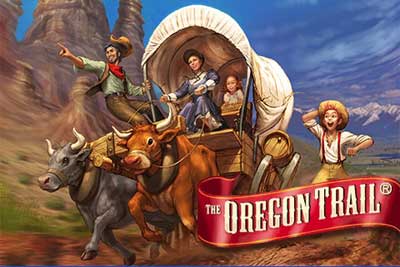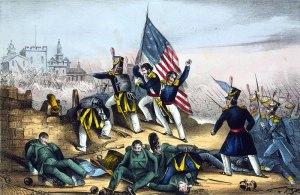The following deals with events, conflicts, and people during the years 1841-1848.
DISCLAIMER: This does NOT serve as a replacement for reading Chapter 17.
The entire sentiment of the 1840s revolved around Manifest Destiny: God had bestowed the continent for our taking. The many areas of conflict were in the Oregon Country, Texas, and California. With new land being acquired, the question of slavery persisted. The answer would only be found in the Civil War.

The Oregon Trail is usually portrayed as a folksy road trip in which people sang show-tunes while they starved to death and resorted to cannibalism.
The Oregon Country was a large stretch of land from North California to the tip of the Alaskan panhandle at the 54°, 40′ line. Originally, Russia and Spain also had a claim in the land, but both had signed it away in treaties. That only left the US and Britain, the latter of whom had the claim of the Hudson’s Bay Company, which made a lot of profit from the fur trade. America’s claim in the land came from missionaries and other settlers, many of whom live peacefully with the Brits. The Treaty of 1818 held that the boundary for the US came at the 49°parallel.
The Brits wouldn’t take this lying down and believed that the Columbia River was the St. Lawrence of the west. The sudden influx of Americans (5,000 by 1840) spoiled any British plan for joint occupation of the land. Britain was forced to sue for peace, but wouldn’t get an answer until after the election of 1844.
The election of 1844 faced oh-god-he’s-running-again Whig Henry Clay, their version of Ralph Nader, against the surprise Democrat candidate James K. Polk. An overwhelming amount of the public believed in Manifest Destiny and quickly supported ‘Young Hickory’ and the expansionist Democrats, who wanted to get all of Oregon. Their slogan was ‘All of Oregon or None’.
Henry Clay attempted to satisfy everyone. Quick tip: it never works. At first, he wanted to admit Texas into the Union as a slave state and then wanted to postpone their entrance to appease the North. Polk barely edged out Clay by 38,000 popular votes. If Clay had won New York, he would’ve won the Presidency. Within three days of Polk’s tenure in office, he annexed Texas.
Polk was a hard-working man who kept to his morals. His first objective in office was a lower tariff. Right away, the Walker Tariff Bill of 1846 lowered tariffs, getting strong support from the South, and was a huge revenue producer because of the heavy imports. Next, Polk wanted to restore the independent treasury in spite of Whig protests. Done. Finally, Polk went after Oregon and California in order to lasso them into the Union.

The Democrats had condemned Clay for his slave-owning habits during the election of 1844. Cool story bro; Polk owned them too.
Like many modern-day politicians, Polk had no intention of keeping his campaign promise of annexing all of Oregon. Polk offered the 49th parallel as a boundary line and after the Brits realized that the Columbia River wasn’t what it was cracked up to it, agreed in 1846. The Senate approved it quickly, though many Americans felt betrayed. We got all of Texas, they pondered, why didn’t we get all of Oregon. Well, when we took Texas from our ‘beard’, Mexico, it was no big shake. Great Britain, on the other hand, was a huge superpower.
California, unlike Texas, was extremely diverse. Polk had wanted to add California to the Union by buying it, but relations with Mexico were worsening. The Mexicans owed us $3 million in damages and threatened war if we tried to acquire more of Texas. Many Texans wanted their boundary line to be the Rio Grande River, while Mexicans didn’t care– to them, all of Texas was still theirs. Polk, quick to defend Texas, wanted to keep all American troops out. Following a false rumor that Britain was going to buy or seize California, John Slidell was sent to Mexico City to offer $25 million for the golden state. The Mexicans wouldn’t budge.
Polk wanted war badly. He first wanted to declare war on the basis of unpaid claims and Slidell’s rejection, but it held no water. To entice Congress to declare war, he sent Old Rough and Ready and 4,000 troops to the Rio Grande and hoped that Mexicans would fire at them. They did, though technically the spot wasn’t on American soil– Polk didn’t make that obvious. Abraham Lincoln insisted that he be shown the spot, but as a freshman congressman, he was drowned out. Polk had no option but to go to war. To wait any longer could mean a British California. Mexico also wanted to fight against the insolent Yankees.
Our first mistake came when we let exiled dictator Santa Anna, no relation to Claus, back into Mexico on the pretense he would sell out his country. Instead he rallied his men and gave them higher chances of winning. As soon as the war had started, John Frémont and his ragtag army overthrew the Mexican government in California and declared it the Bear Flag Republic. Meanwhile, Zach Taylor was having difficulty getting past northern Mexico, so command was given to General Winfield Scott.
Scott would reach Mexico City in September 1847 with his fairly small army. Polk sent the chief clerk of the State Department, Nick Trist, down to arrange an armistice with Mexico. In addition, they would bribe Santa Anna with $10,000. Though he was supposed to stop the fighting, Santa encouraged it even more. Trist was recalled to Washington but stayed in Mexico City to negotiate the Treaty of Guadalupe Hidalgo. The document, signed in 1848, gave half of Mexico to the US, including the large stretch of land from Texas to Oregon, for only $15 million. They would also have to pay $3.25 million for other damages.
The only problem left was Congress, which was extremely divided. The Whigs, who controlled the House, felt that the war was unnecessary while expansionist Democrats wanted all of Mexico, damnit. Calhoun, thinking that the South shouldn’t be too greedy, rallied his Democrats to vote for the treaty. If the deliberation over the treaty had taken any longer, we might have gotten nothing.
The Mexican War, though pretty small, was extremely successful. We got more land than in the Louisiana Purchase and Manifest Destiny was never more present. It also readied the nation for the Civil War as many famous men, namely Lee and Grant, first fought in this war. The navy and the army had both stepped up big time and earned from respect from Britain and the like.
Since the time of the Monroe Doctrine, we claimed to represent both Americas. Now, it seemed like we lorded over them. Because of the war, we were now seen as a bully whowas just after others’ land. Slavery was also an issue in the Mexican War– Texas was admitted as a slave state and many of the volunteers in the war were from the south. However, there was no conspiracy and Texas was a slave state was simply because it was in the south, if that makes any sense at all.
Senator David Wilmot introduced an amendment that stated slavery could not exist in any territory acquired from Mexico. Nearly all free state legislatures approved it, but to everyone’s surprise, not one southern state would give it the a-okay. The Mexicans snickered in delight, knowing that the new American land would lead to more dissent among them and would be the perfect chance for them to exact Santa Anna’s revenge.


Discussion
No comments yet.